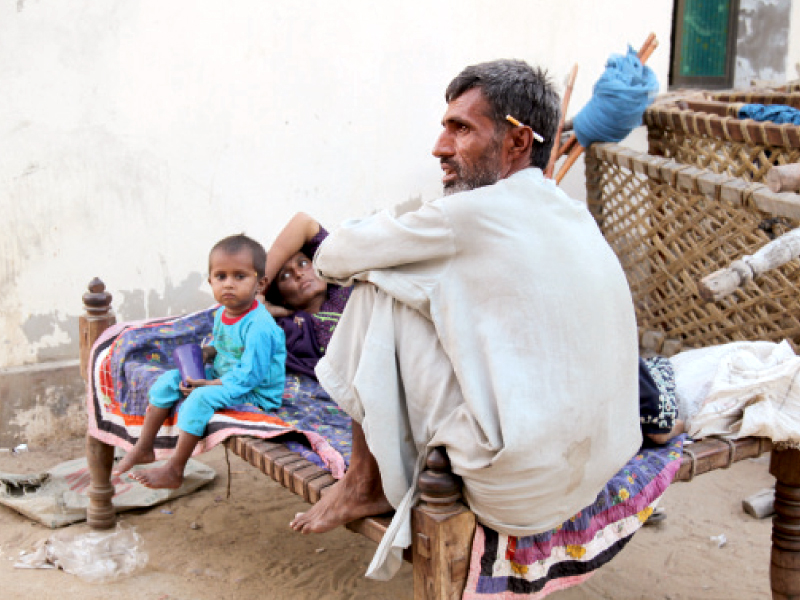
"I cannot breastfeed my child or give her goat's milk. She has been wailing incessantly since the day she was born," said Sodhi, a young woman at the malnutrition ward of Civil Hospital, Mithi. "I don't know what is wrong with her but the doctors have assured she will recover soon," she hoped.
Most children at this ward weigh less than two kilogrammes. Not just the children, their mothers too are weak, weary and anaemic which renders them incapable of feeding their children, say local doctors. They simply do not eat enough and do hard labour in the fields until the day of delivery. "I feel slightly better now but my child is still unwell," said Sodhi, who was sitting on a mat, stroking her child in the cot. The child was born five weeks ago and weighed 1.6 kgs at the time of birth. On the day, there were 52 children under five years of age, admitted to the 130-bed hospital.
Another woman at the ward, Dholi, said she was looking after her grandchild. "My grandson is very sick. Will your report help us?" she asked meekly. Her daughter had lost a child due to a miscarriage last year and had given birth to a premature baby this year. The irony is that Dholi lives in a village near Islamkot, the site where the government claims lie the world's largest coal reserves. "I am a midwife and help the women of the village at the time of delivery," she said. "Unfortunately, it is not in my powers to stop premature births."
During a survey of the nursery, malnutrition and other wards of the hospital, the mothers admitted they never ate or rested enough. Asked if their diet consisted of milk, meat, fish, chicken, eggs or vegetables, the women simply smiled sadly. "This is the third consecutive drought. We are lucky to have a meal once a day," said Nazeeran Khaskheli, mother of eight children. "We mostly eat chutney made of red chillies and saag, with dry bread." She claimed it was three months since she had last eaten meat.
Over 80 per cent of the children admitted here weigh below two kilogrammes. "The child cannot be healthy until the mother is healthy. How do you expect the mother to be healthy when she works round-the-clock on an empty stomach?" asked Dr Shafqat Hussain Dahri, the medical superintendent of the Civil Hospital, Mithi.
Speaking about the total death toll, Dr Dahri called it a media-created hype. "The total death toll of children in the current year is 230, not 535," he said, adding that all basic facilities have been provided to the hospital with the induction of two child specialists and gynaecologists as well as the establishment of two new wards.
Independent sources, however, refuted the doctor's claims, saying that 47 children have died in the past one week alone. "Contrary to the chief minister's claims of providing excellent facilities at the civil hospital, you will find patients waiting to be checked in the corridors for hours on end," said a local journalist, Sanjay Sadhwani. Some entrepreneurs have even started a business of renting out charpoys which the patients use as beds, due to the lack of beds in the hospital.
Officials claim to have appointed 70 doctors against the 200 vacant posts in Tharparkar.
"We have appointed doctors in each of the five talukas of the district and have restored all 44 basic health centres and 77 dispensaries," said Pakistan Peoples Party MPA Dr Kahtumal Jeevan, who belongs to Tharparkar district. "Around 25 per cent of Thar has now been covered and we will continue our efforts but it is a slow process."
Residents who are victims of the tragedy, however, do not believe in the government's promises. They don't believe the cursory attempts towards improvement of the healthcare system and distribution of wheat will help the people.
"We do not need ad hoc measures such the distribution of wheat which a family of ten will consume within five to seven days," said Hot Faqir, who was at the hospital with his sick child. "What we need is a long-term sustainable solution. Most importantly, we need water for drinking and irrigation." He added that the land in Thar was fertile, but severe water shortage had made it barren.
Published in The Express Tribune, December 3rd, 2014.

















COMMENTS
Comments are moderated and generally will be posted if they are on-topic and not abusive.
For more information, please see our Comments FAQ